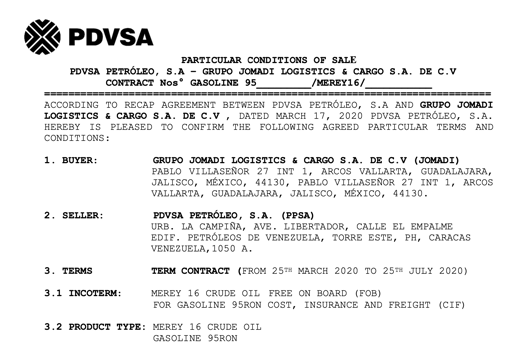The United States (US) has imposed sanctions on the Venezuelan Government of Nicolas Maduro, the state oil company PDVSA, and all those who enter into contracts with them. Nowadays, according to the Spanish news portal, ABC Internacional, Grupo JOMADI, A company established in Mexico, will trade five (5) million barrels of oil at a discount price and pay with 95 octane fuel (gasoline). For this situation, the White House confirms that it will open an investigation to this and two other Mexican companies because they sell oil for fuel, corn, and water.
Despite the fact that multiple companies such as the Russian Rosneft, the Italian Eni, and the Spanish Repsol have been sanctioned for exchanging oil for gasoline to the state oil company PVSA, the company Grupo Jomadi Logistics & Cargo S.A. de C.V. It would receive the shipment between March 25 and July 25 at Turkish ports. Trump has warned this and the India Reliance to completely cut off the supply with the Venezuelan government.
The JOMADI Group did not appear in records of oil transactions since its foundation in 2012. With its registered office in Guadalajara, Jalisco receives permission to market oil products in 2016 and as of this date, it declares to have imported at least one billion liters of jet fuel, aviation fuel distilled from the crude oil refining process, and 18 million gasoline of different octane numbers. Between 2017 and 2018, he declared having imported nine million liters of diesel, according to Mexican official records.

Despite the fact that Venezuela controls the largest oil reserves in the world, the US sanctions on Venezuela prevent the import of the materials necessary for the refining process with what it produced for its national demand and export. The installed production capacity of 1.3 million barrels per day is currently at 100,000 for the same day. Diesel is especially important for Venezuela as it drives generators, transportation of people, merchandise, even food.
One of the main questions, in this case, is the origin of the 95 octane gasoline that the JOMADI Group undertakes to transfer to Venezuelan government tankers. Likewise, the government of President Trump questions a recent agreement between two Mexican companies, Libre Abordo and Schlager with PDVSA. The latter stipulates that these two companies, with little experience in the oil sector, will acquire a total of 15 million tons of crude from PDVSA in exchange for 210,000 tons of corn and 1,000 tanks of drinking water. They assure that they serve the Venezuelan Government to evade the harsh regime of the sanctions approved last year.
Lift sanctions
According to information portal ArgusMedia, the US would be reconsidering the premise behind its previous decision to allow Chevron and other US and international companies to continue their presence in Venezuela, as pressure from sanctions designed to compel Venezuelan President Nicolás Maduro increases. to resign.
Until now, Chevron and European oil companies have been exempt from United States oil sanctions imposed in January 2019, allowing them to continue operations in Venezuela and lift loads of crude from operations of joint ventures with state-owned PDVSA. The exemptions have come with stringent conditions designed to prevent foreign oil companies from providing direct funds to PDVSA or the Maduro government. The last authorization for Chevron and the US oil companies to operate in Venezuela expires on April 22.
The instability facing world oil markets due to the collapse of demand caused by the coronavirus pandemic is adding new dimensions to the change in the approach of the US administration towards the country of OPEC.
